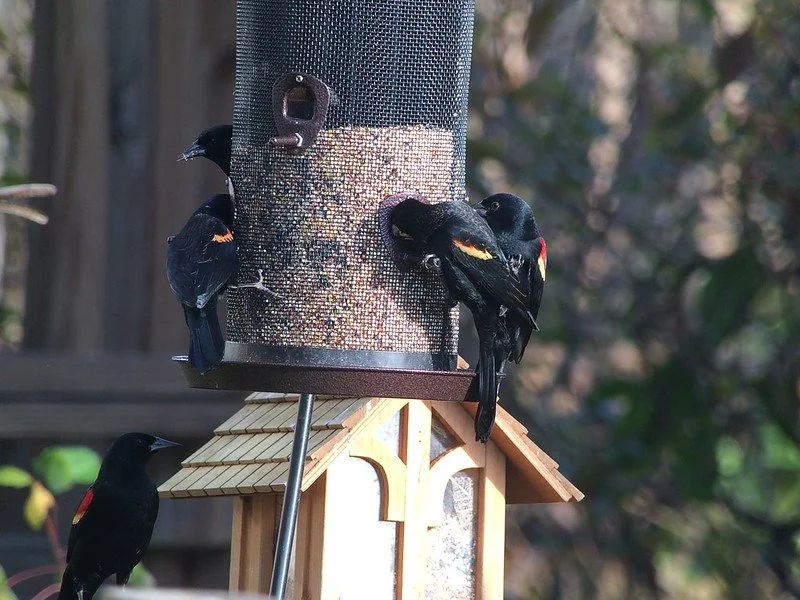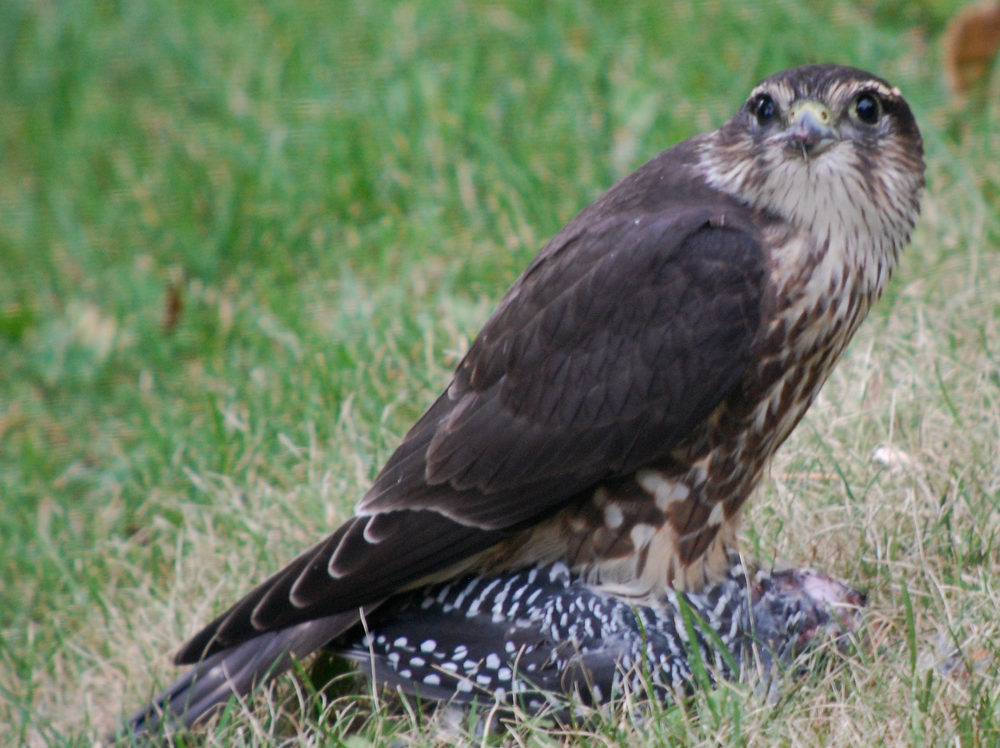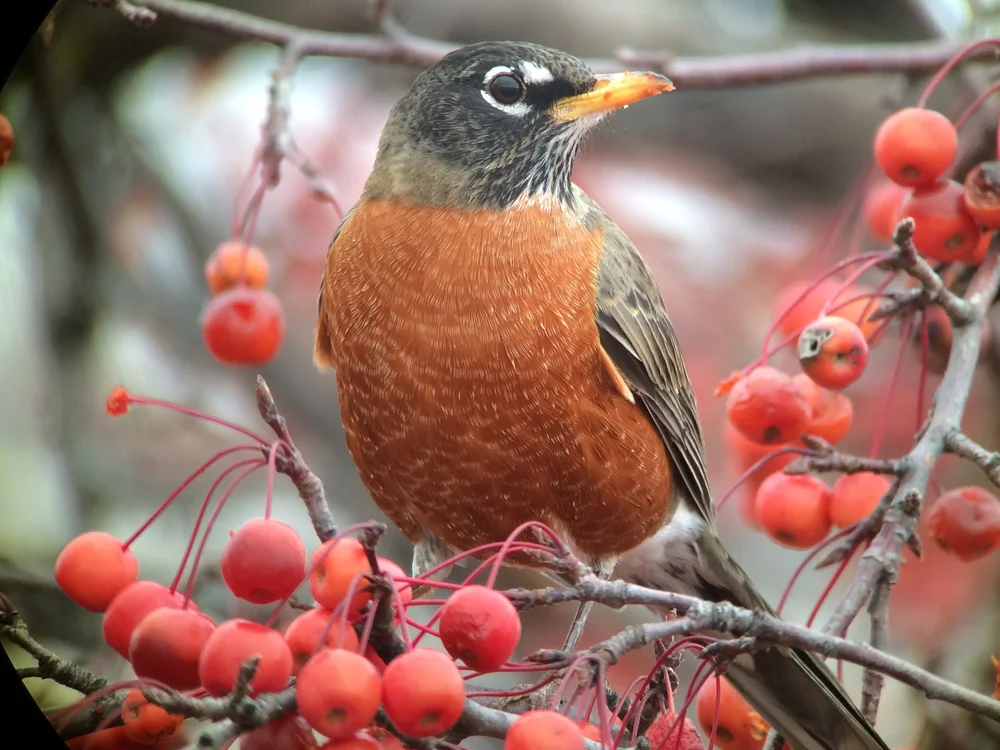Short answer: Yeah, probably.Long answer: Am I going to judge you if you keep your bird feeders filled because it is the one damn thing that got you through the last two years? Nope. If you stop offering seed...
Short answer: Yeah, probably.
Long answer: Am I going to judge you if you keep your bird feeders filled because it is the one damn thing that got you through the last two years? Nope.
If you stop offering seed will the birds starve? Not a healthy bird. They know how to find food from a variety of sources.
Will closing down your bird feeders stop the spread of the virus? It will slow the spread, but not stop it.

Red-winged blackbird congregate around a bird feeder.
Pandemics just don’t seem to stop do they? And now we have HPAI or Highly Pathogenic Avian Influenza (it’s highly contagious to other birds). There have been lots of reports of waterfowl with a highly contagious form of avian influenza migrating north and spreading it to other species this spring. Birds are already affected in Minnesota. The main wildlife rehab center in Minnesota has stopped taking in certain species of birds including ducks, geese, herons, and gulls. As of this writing, they have not advised people to stop feeding birds. The University of Minnesota’s Raptor Center has stopped all public tours and sees a 90 - 100% fatality rate in infected birds of prey brought to them. They have advised people to stop feeding birds. There have been reports of blue jays, crows, and ravens all testing positive for it. Most recently, a well known great horned owl nest at Lake Nokomis in Minneapolis failed with all the owlets and adults dying as a result of the virus.
This is just what we know about wild birds. As of this writing 7 flocks of poultry in Minnesota have tested positive for HPAI and all have been killed. Millions of poultry around the country have been culled due to HPAI infections.

Merlin eating a red-bellied woodpecker it just killed.
The virus is so contagious that an infected duck could fly over a yard, poop, and that poop landing in the yard could spread very easily to other birds. Ducks that are congregating on open for migration are spreading it to each other. Birds of prey like great horned owls that would see a sick duck will eat it and feed it to their young and all get the virus and die. Blue jays and crows could scavenge a duck carcass with HPAI and then they have it. Blue jays will also visit your bird feeder, potentially spreading it to other birds. We don’t know what effect HPAI will have songbirds—this is all happening very fast and we don’t have the resources to study it. And study takes time. We don’t know if HPAI will be as lethal to songbirds as it is to waterfowl, birds of prey, and domestic poultry.

Robin feeding on crabapples.
I’m getting ready to move to Alaska this week so my bird feeders were already scheduled to go empty. However, I have lots of native plants in the yard specifically to attract birds. There are certain areas the sparrows congregate to get seeds that fall from my native plant seed heads. Two days ago I was walking the neighborhood and two dozen robins and a few waxwings were all concentrated in a crabapple feeding around each other. Red-winged blackbirds and grackles are passing through in large flocks, making stops in wetlands around ducks and then visiting our yards with or without bird feeders. They may forage on the ground along side a pair of robins. This will all spread HPAI regardless of bird feeders. Even though my bird feeders are coming down this week, I still have set up situations where they will congregate. Heck, when it rains, any puddle is a huge bird magnet. I can’t control the puddles.
You should absolutely stop feeding birds if you or your neighbors have backyard chickens, ducks, or even pet birds inside. If I still had my cockatiel, I would even consider taking shoes off outside and keeping them outside and have a shoes that are for inside the house only.
You should absolutely stop feeding birds if you see a bird that is showing signs of illness in your yard or at your feeder. Signs include sitting puffed up and eyes half closed for long periods of time. A bird that allows you to approach too closely, or is having trouble walking or flying, or is shaking its head or has trouble maintaining any kind of balance is also showing signs of illness. When this happens you should cease feeding for at least week regardless if it's HPAI, house finch conjunctivitis, or salmonella. And your feeders should be cleaned with a mild solution of bleach and water.
In some ways this feels like the start of West Nile Virus. Back then I did pick up for The Raptor Center and so many birds of prey were affected, I wondered if we would have any red-tailed hawks left when it was over. I remember dead crows all over the place. Those species bounced back. Hopefully, if we stop feeding birds for a time that will slow down the spread to give birds with immunity a chance to catch up and put more chicks into bird populations.
On the upside HPAI currently isn’t contagious to humans.









